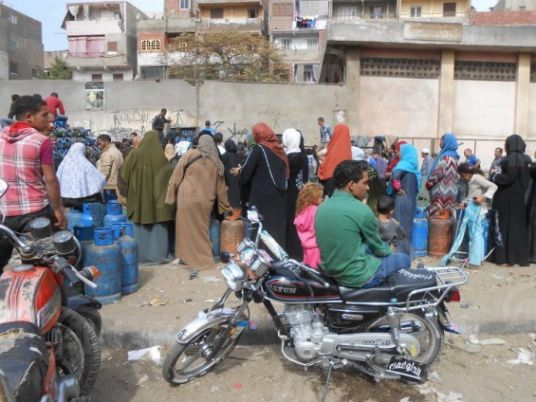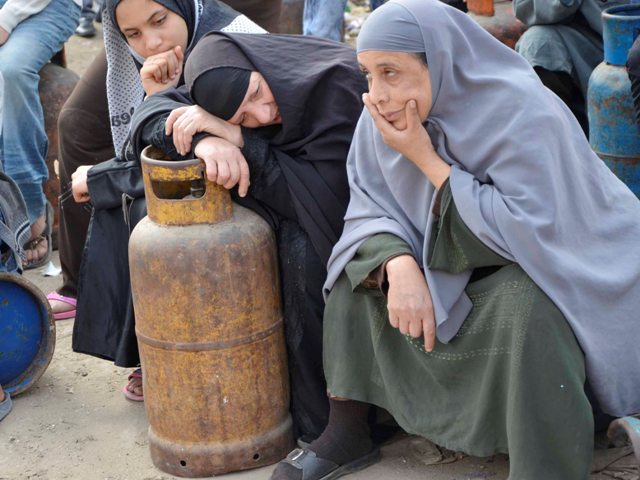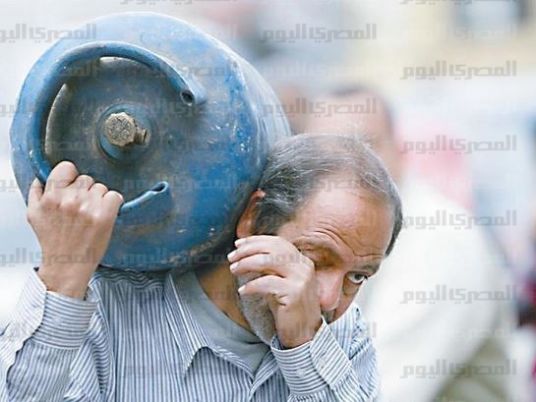
Civil servant Ashraf Shukri had to absent himself from work so as to have enough time to refill his empty butane gas canister at a nearby distribution center.
Although he arrived at the center in downtown Cairo in the early hours of the morning – taking his place in a seemingly endless line of other gas-thirsty patrons – Shukri wasn't sure whether he would succeed in getting a refill.
"I can wait here for hours before the people inside [the distribution center] tell me they've run out of gas canisters," Shukri told Anadolu Agency as he waited in line. "I really hope this crisis ends soon."
The acute shortage of butane gas clearly manifests itself on the streets of Egypt.
Tens of thousands of Egyptians wake up early every day and lug their empty gas canisters on their shoulders and heads to the nearest distribution center, dreaming of a refill.
But most people like Shukri run the risk of returning home empty-handed.
While hundreds of thousands of Egyptian homes have natural gas piped directly into them, millions of others continue to rely on butane gas canisters for their cooking needs.
Butane shortages have always been a thorn in the side of successive Egyptian governments.
When a shortage hit the country a few months ago, Egyptians fought – even, in some cases, killed – each other to get their hands on the limited canisters available.
But the latest shortage is the first time that Egypt's army-installed interim government has faced the problem.
Earlier this week, interim Supply Minister Mohamed Abu Shadi vowed that the crisis would soon be contained.
He asserted that his ministry had raised the number of butane gas canisters sent daily to distribution centers around the country from 1 million to 1.3 million.
On Friday, an official at the state-run Egyptian General Petroleum Company announced that Saudi Arabia planned to send Egypt this month two butane gas shipments – worth a total of $75 million – for free.
The first of the 700,000-ton shipments is due to arrive in the Port of Suez on Tuesday, to be followed by a second in late November, the official told AA.
Since the July 3 ouster of elected President Mohamed Morsi by the army, Saudi Arabia has pledged $5 billion in aid to Egypt, including $2 billion worth of petroleum products.
– Mercy –
Outside the distribution center where Shukri waited, the impatience, anger and desperation were palpable.
"Have mercy," shouted one old woman standing on line.
As tempers rose, one distribution worker told the crowd that the truck carrying the coveted canisters was about to arrive.
It was already 7:30am and some of those waiting had been standing in line for almost two hours.
While the news appeared to hearten some of those waiting, others – including Shukri – knew better.
"I was here before, and when my turn came, the distribution people told me they were sold out," he recalled bitterly.
The scene wasn't much different elsewhere in downtown Cairo, where people flocked to another gas distribution center only meters from the iconic Tahrir Square.
Elderly women and men carried empty canisters on their shoulders and heads, their faces betraying the enormity of their predicament.
One center worker claimed they had received only half of their usual daily supply.
"That's why we can't give canisters to everyone," he told AA as he looked at the growing queue outside.
His assertion, which could not be independently verified, appeared to contradict the supply minister's announcement regarding the 30-percent increase in daily butane supplies.
However, it's an open secret in Egypt that, during such crises, the wallets of smugglers and traders swell.
One of those who stood in line outside the center said that his brother, who worked as an office boy for a monthly salary of 900 Egyptian pounds (roughly $130), had to buy a gas canister two days earlier for a whopping 60 pounds (about $8.6).
The government sells gas canisters to citizens for 10 Egyptian pounds (about $1.4), while paying around 60 pounds to produce them – opening the door to smuggling by unscrupulous traders, some experts say.
"I, too, could have bought a canister for 60 pounds," Youssef Moussa, a doorman, told AA.
"But that would have been more than 10 percent of my monthly salary."



